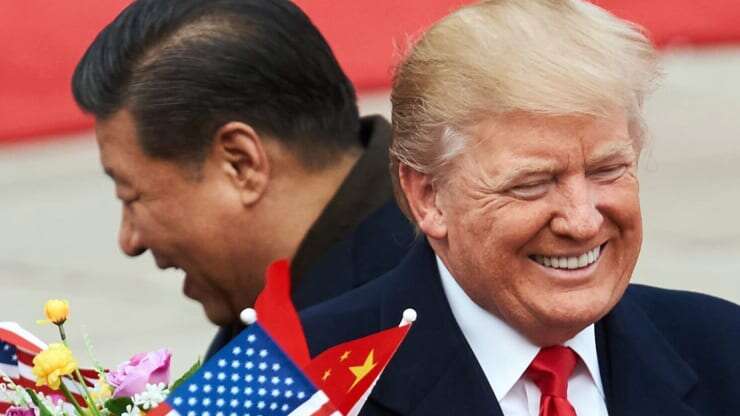Ian Buruma
Instead of using all the powers of the US federal government to limit the ravages of COVID-19, President Donald Trump’s administration is wasting precious time and energy blaming China for the spread of the virus. Pundits speak of a new cold war. But if the United States really intends to confront China in a struggle for global leadership, Trump is botching it badly.
Even as the Chinese government is showering countries around the world with supplies to combat the pandemic, and even sending medical teams, Trump cut off air travel from Europe without even bothering to inform America’s European allies. Since March, the Chinese government has contributed $50 million to the World Health Organization, while Trump, claiming that the WHO is “China-centric,” has frozen US funding.
When G7 foreign ministers held a video conference to discuss a common strategy to fight COVID-19, US Secretary of State Mike Pompeo’s contribution was to insist that the pathogen be called “Wuhan virus,” after the Chinese city of its presumed origin. Fed up with Trumpian antics, the other ministers ended the conference without a conclusion.
Chinese largesse does not come without strings, of course. The WHO cravenly refused to acknowledge Taiwan’s success in limiting the virus, or even to admit Taiwan as a member, for fear of offending mainland China. And while the US government was promoting conspiracy theories about China, the European Union softened its criticism of deliberate Chinese misinformation after China threatened to retaliate.
The effectiveness of China’s intimidation is a sign of its growing economic power. Presumably, such tactics would be less effective if the Western allies, as well as such interested parties as Japan, South Korea, and Southeast Asian countries, were to stick together. In the past, any such common front would rely on American leadership. But the current administration’s self-centered ineptitude rules this out. In the long run, this might let China take the lead, faute de mieux.
In fact, Western countries have rarely had a common policy on China, and the reasons for this haven’t changed much since the late eighteenth century, when Lord Macartney was dispatched by King George III to establish diplomatic relations with the Chinese Empire. One of the ironies of this failed mission was that the British were looking to trade in goods other than opium with China. But the Qianlong Emperor stated that there was nothing the Chinese needed from the British.
The point, however, is that China saw itself as the center of the civilized world. Missions from abroad could only be seen as bearers of tribute, and never as equals. Macartney, confident that Britain was the world’s premier power, couldn’t possibly deal with China on that basis. The Dutch, rather like the EU today, were primarily interested in cracking the Chinese market and were prepared to play by China’s rules.
Even though Britain’s clout has waned, the clash of great powers in Macartney’s time still resonates. For almost a century, the American claim to be the peerless model of civilization has been no less grandiose than the Sino-centric views of the Qing emperors.
When China was impoverished and at the mercy of the world’s great powers, it was easy for Americans to patronize the Chinese as potential converts to democracy, capitalism, and Christianity. Dealing with the rampant Japanese Empire in the early twentieth century, on the other hand, was much harder. When Japan, as a signatory of the Versailles Treaty in 1919, asked for a clause against racial discrimination among members of the League of Nations, the US (and Australia) turned it down.
There was hardly any money to be made in China under Chairman Mao Zedong. Even so, Western countries failed to agree on how to deal with him. When Britain recognized the People’s Republic of China in 1950, just one year after the revolution, the US, gearing up for its crusade against global Communism, was furious. Until the 1970s, Washington recognized Chiang Kai-shek’s Nationalist regime on tiny Taiwan as the only legitimate government of China.
Now that there is a great deal of money to be made in China once again, we are back to the time of Macartney. The borders of the Middle Kingdom are more or less the same as those of the Qing Empire. The government is no more democratic than it was under the Qianlong Emperor. And, after a century of wars, invasions, mass poverty, and bloodshed, China is again held up as a model of civilization that barbarians are expected to follow.
The prospect of Chinese global leadership is not inviting. But the US is rapidly fading as an alternative. The “American Century” was marked by many foolish wars, ideological rigidity, and unconscionable support for some very nasty dictatorships. And yet, global adherence to US leadership was widely based on respect for a form of government that, however flawed in its execution, spoke to the human aspiration for freedom, including in parts of the Chinese-speaking world.
The same is not true for China today. If China wishes to lead the world, it will have to offer more than money and intimidation. Freedom still matters. Why else did Chinese student protesters erect a ten-meter-high Goddess of Democracy in Tiananmen Square in 1989? China will be incapable of advancing that cause on a global scale without first starting at home.
Ian Buruma is the author, most recently, of ‘A Tokyo Romance: A Memoir’. ©Project Syndicate
